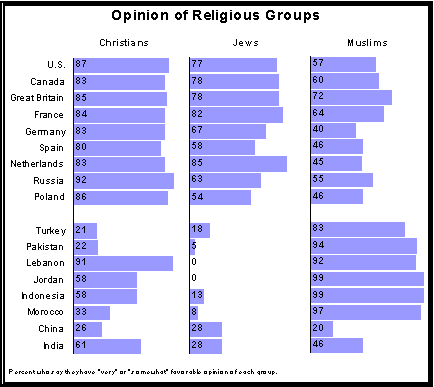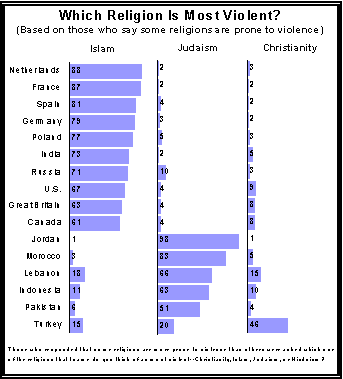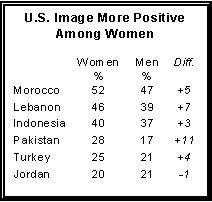While there are concerns in Western countries about Islamic identity and extremism, these do not necessarily translate into unfavorable views of people of the Muslim faith. In Europe and North America, majorities in Great Britain, France, Canada, the U.S., and Russia, as well as pluralities in Spain and Poland, say they have somewhat or very favorable views of Muslims. Only in the Netherlands and Germany does opinion tilt toward an unfavorable view (51%-45% unfavorable in the Netherlands; 47%-40% unfavorable in Germany). While fewer hold positive opinions of Muslims relative to either Jews or Christians in every Western country surveyed, the differences are relatively modest compared to the gap between views of these groups among publics of most Muslim countries surveyed.

Predominantly Muslim countries have mixed views of Christians and strongly negative views of people of the Jewish faith. Majorities in Jordan (58%) and Indonesia (58%) have positive views of Christians. In Lebanon, with its large Christian minority, more than nine-in-ten (91%) think favorably of Christians; these overwhelming positive views hold among both Muslim (86% favorable) and Christian (100% favorable) Lebanese. However, in both Turkey and Pakistan, the majority view of Christians is unfavorable, by margins of 63% unfavorable to 21% favorable in Turkey and 58% unfavorable to 22% favorable in Pakistan.
Throughout the Muslim world, opinions of Jews are highly unfavorable. Dislike of Jews is universal in Jordan and Lebanon, with 99% of the publics in both countries saying they have a very unfavorable view of Jews (the remaining 1% in Jordan takes a “somewhat unfavorable” view, while in Lebanon 1% offer no response). Similarly, 76% of Indonesians, 74% of Pakistanis, and 60% of Turks have an unfavorable opinion of Jews.
In India, with its Hindu majority and substantial Muslim population, the public tends to hold a favorable opinion of Christians, but is closely divided with respect to opinions of Muslims. About six-in-ten Indians (61%) hold a favorable view of Christians — a figure that holds among both Hindus and Muslims. Among the Hindu majority in India, views of Muslims are closely divided with 42% viewing them favorably and 44% unfavorably; for all Indians, the divide tilts favorable by 46% to 43%.
In China, however, majorities or pluralities hold negative views of Muslims, Christians and Jews. A 50% majority views Muslims unfavorably while only 20% have a favorable opinion. Similarly, 47% view Christians unfavorably while just 26% express a positive opinion. Chinese respondents express comparable opinions of Jews (49% favorable/28% unfavorable).
Religions and Violence
 Majorities or pluralities in the U.S., Canada, and every European country, other than France, judge that some religions are more prone to violence than others. And when those taking this view are asked which religion they think of as more violent, Islam is designated by large majorities in each of these countries.
Majorities or pluralities in the U.S., Canada, and every European country, other than France, judge that some religions are more prone to violence than others. And when those taking this view are asked which religion they think of as more violent, Islam is designated by large majorities in each of these countries.
For the most part, people in predominantly Muslim countries are less likely to express the view that some religions are more prone to violence. Only in Jordan does a large majority (75%) say that some religions are more violence prone than others, with 98% of those holding this view pointing to Judaism as most violent. Similarly in Morocco, a 40% plurality views some religions as more violent than others, with most (83%) pointing to Judaism as most violent. In Pakistan, a 40% plurality views some religions as more violent, but while half (51%) choose Judaism as most violent, 31% designate Hinduism.
Fewer than 20% of Lebanese and Indonesians deem some religions more prone to violence than others; among these respondents more than six-in-ten in both countries (66% and 63%) select Judaism as most violent, with the rest split about evenly between Christianity and Islam. In Turkey, however, about a quarter (26%) of the population subscribes to the view that some religions tend to violence more than others; a plurality (46%) points to Christianity as the most violent.
In India, a majority (52%) thinks all religions are about the same in terms of violence; among the 39% who see some as more violent than others, nearly three-in-four (73%) point to Islam, while 17% designate Hinduism.
Banning Head Scarves
 The decision by some countries to ban the wearing of head scarves by Muslim women in public places — including schools — draws a uniformly negative reaction in the Muslim world. In non-Muslim countries, by contrast, there is a substantial division of opinion over this issue.
The decision by some countries to ban the wearing of head scarves by Muslim women in public places — including schools — draws a uniformly negative reaction in the Muslim world. In non-Muslim countries, by contrast, there is a substantial division of opinion over this issue.
Majorities in the U.S., Canada and Great Britain, as well as pluralities in Spain, Russia and Poland, view such bans as a bad idea. However, in France, a large majority (78%) favors such prohibitions. They are joined in this view by smaller majorities in Germany (54%), the Netherlands (51%) and by two-thirds of the Indian public (66%).
In Turkey, 64% of the public calls such a ban a bad idea, as do large majorities in Jordan (97%), Indonesia (95%), Morocco (90%) and Pakistan (77%). In Lebanon, nearly all Lebanese Muslims (99%) disapprove of a ban on head scarves, but 71% of Lebanese Christians approve.
In most non-Muslim countries, opinions on policies that bar Muslim women from publicly wearing head scarves are related to perceptions of Islamic separatism and concerns about Islamic extremism. Across Western Europe and North America, those supportive of the ban register greater concern about Islamic extremism in their countries. Opinion about the head scarf issue in India is unrelated to extremism concerns, however. People in non-Muslim countries who think a ban is a good idea also are more likely to perceive Muslims in their country as wanting to be distinct from the larger society; this is especially the case in the Netherlands.
Demographic Differences in U.S. Image
 A previous Pew Global Attitudes report, released June 23, showed some improvement in the U.S. image in the Muslim world (“U.S. Image Up Slightly, But Still Negative: American Character Gets Mixed Reviews“). Yet majorities in five of six predominantly Muslim countries surveyed continue to express unfavorable opinions of the United States. Morocco is the lone exception; in that country, favorable views of the U.S. outnumber unfavorable opinions by 49%-44%.
A previous Pew Global Attitudes report, released June 23, showed some improvement in the U.S. image in the Muslim world (“U.S. Image Up Slightly, But Still Negative: American Character Gets Mixed Reviews“). Yet majorities in five of six predominantly Muslim countries surveyed continue to express unfavorable opinions of the United States. Morocco is the lone exception; in that country, favorable views of the U.S. outnumber unfavorable opinions by 49%-44%.
The survey also finds modest, but noteworthy, demographic differences in opinions of the U.S. in several countries. In general, younger people and women express more positive views than do older people and men.
The United States is viewed more favorably by people under age 35 than by older people in Morocco, Lebanon, Pakistan and Turkey. As America’s image has improved in Morocco over the past year, more young people are giving the U.S. favorable marks (53%) than Moroccans ages 35 and older (45%). A similar generational gap is seen in Lebanon, where the percentage rating the U.S. favorably has increased from 27% to 42% since 2003. (The pattern recurs in Jordan, but the differences by age are not statistically significant.) A sizable generational difference is also seen in both Pakistan and Turkey, where overall views of America remain predominantly negative, with younger people 10-to-12 points more likely to give a favorable rating than their seniors.
 The polling shows a modest gender gap in the U.S. image in most Muslim countries; women are less likely to offer an opinion of the U.S. than are men, but when they did, they held a somewhat more positive opinion. Women are more likely to have favorable views of the U.S. relative to men in Pakistan (28% of women compared with 17% of men) and in Lebanon (46% to 39%). The pattern also occurs in Turkey, Morocco, and Indonesia, but the differences are not statistically significant. No gender differences are observed in Jordan where opinions of the U.S. are highly negative (only about a fifth of either gender has a somewhat or very favorable view).
The polling shows a modest gender gap in the U.S. image in most Muslim countries; women are less likely to offer an opinion of the U.S. than are men, but when they did, they held a somewhat more positive opinion. Women are more likely to have favorable views of the U.S. relative to men in Pakistan (28% of women compared with 17% of men) and in Lebanon (46% to 39%). The pattern also occurs in Turkey, Morocco, and Indonesia, but the differences are not statistically significant. No gender differences are observed in Jordan where opinions of the U.S. are highly negative (only about a fifth of either gender has a somewhat or very favorable view).
Voices
Reporting by the International Herald Tribune*
“I see more headscarves. I feel this is not a good thing. A part of the Muslim population keeps more apart than before. I thought it would only be a matter of time before the Turks would integrate. You hear more, too, about honor killings. They don’t have to be like us. It starts to be difficult when everyone has their own laws. There is a sense of drifting apart as if splitting the society.”
– A 42-year-old piano teacher in Berlin
“Especially in this region and especially in this country, where: a) the majority of the population is Muslim and b) you have a resistance group (Hizbullah) to whom the people feel loyalty because of its ability to end Israeli occupation… the Christian/Muslim factor is natural. The Christians did not live the Israeli occupation in the same way the Muslims in south Lebanon did. So Muslims in this country have a certain loyalty to Hizbullah and its role as a resistance group.”
– A 27-year-old primary school teacher in Lebanon
“Muslims want to be recognized as ”Muslims,” not as ”Arabs” or immigrants. In this sense, the way Islam reasserts itself has more to do with the Christian ”born-agains” than with a pristine Arabic culture. The sense of threat among French public opinion (which by the way is also directed towards cults like Scientology) comes from the fact that the French political culture is based on the rejection of religion from the public sphere, whatever the religion. Any religious assertiveness is seen as a threat.”
– A senior researcher at Centre National de la Recherche Scientifique, Paris
“How can our religion be a cause of danger? Islam teaches kindness and love for humanity. Islam is moderation, not extremists. Extremists are not real Muslims. They just give us a bad name.”
– A 48-year-old housewife from Rawalpindi, Pakistan
“The problem is expectations, not only in Germany but in other countries in Europe. There is the attitude that the more secular you become the more of a “good citizen” … If society expects a Muslim not to be a Muslim, but a good citizen, we have a problem… The more secular a society becomes, say like Germany, you wonder how tolerant and understanding it is of religious identity. 9/11 changed a lot. Islam was seen as non-modern. If people go to a mosque, they are seen as non-modern. This is a danger.”
– A 39-year-old parliamentarian, born in Germany of Turkish parents
“The French … have no problems with Dutch, German or British immigrants, but a different color and a different religion are still real barriers for most people. Such sentiment is bound to increase after the London attacks — that’s natural perhaps but I find it really sad.”
– Antique stall owner in a Paris flea market
*Interviews were conducted by Katrin Bennhold in France, Judy Dempsey in Germany, Salman Masood in Pakistan, Evelyn Rusli in Indonesia and Marlise Simons in the Netherlands, all of the International Herald Tribune and Mayssam Zaaroura in Lebanon of The Daily Star.


